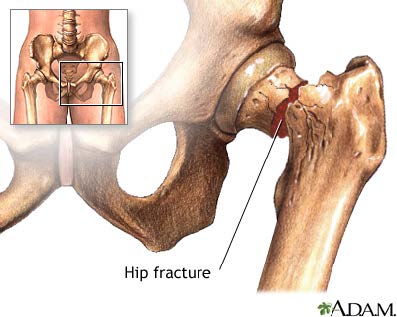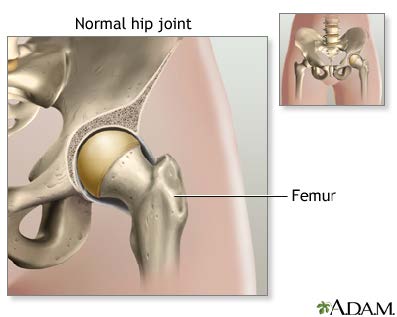Important Facts About Hip Joint Replacement You Want To Know
Hip joint replacement is surgery to replace all or part of the hip joint with a man-made joint. The artificial joint is called a prosthesis.
Description of hip joint replacement surgery
Your hip joint is made up of two major parts. One or both parts may be replaced during surgery:
- The hip socket (a part of the pelvic bone called the acetabulum)
- The upper end of the thighbone (called the femoral head)
The new hip that replaces the old one is made up of these parts:
- A socket, which is usually made of strong metal.
- A liner, which fits inside the socket. It is usually plastic, but some surgeons are now trying other materials, like ceramic. The liner allows the hip to move smoothly.
- A metal or ceramic ball that will replace the round head (top) of your thigh bone
- A metal stem that is attached to the thigh bone to make the joint more stable.
You will not feel any pain during hip joint replacement surgery.
You will have one of two types of anesthesia:
- General anesthesia. This means you will be asleep and unable to feel pain.
- Regional (spinal or epidural anesthesia). Medicine is put into your back to make you numb below your waist. You will also get medicine to make you sleepy. And you may get medicine that will make you forget about the procedure, even though you will not be fully asleep.
After you receive anesthesia, your surgeon will make a surgical cut to open up your hip joint.
Often this cut is over the buttocks. Then your surgeon will:
- Cut and remove the head of your thigh bone
- Clean out your hip socket and remove the rest of the cartilage and damaged or arthritic bone
- Put the new hip socket in place, then insert the metal stem into your thigh bone
- Place the correct size ball for the new joint
- Secure all of the new parts in place, sometimes with a special cement
- Repair the muscles and tendons around the new joint
- Close the surgical wound
This surgery takes about 13hours.
Before the Hip Joint Replacement
Always tell your doctor or nurse what drugs you are taking, even drugs, supplements, or herbs you bought without a prescription.
During the 2 weeks before your surgery: Prepare your home. Two weeks before surgery you may be asked to stop taking drugs that make it harder for your blood to clot.
These include aspirin, ibuprofen (Advil, Motrin), naproxen (Naprosyn, Aleve), blood thinners such as warfarin (Coumadin), and other drugs. You may also need to stop taking medicine that can make you more likely to get an infection.
This includes methotrexate, Enbrel, and other medicines that suppress your immune system. Ask your doctor which drugs you should still take on the day of your surgery.
If you have diabetes, heart disease, or other medical conditions, your surgeon will ask you to see the doctor who treats you for these conditions.
Tell your doctor if you have been drinking a lot of alcohol, more than 1 or 2 drinks a day. If you smoke, you need to stop. Ask your doctor or nurse for help. Smoking will slow down wound and bone healing.
Always let your doctor know about any cold, flu, fever, herpes breakout, or other illness you have before your surgery.
You may want to visit a physical therapist to learn some exercises to do before surgery and to practice using crutches or a walker.
Set up your home to make everyday tasks easier
Practice using a cane, walker, crutches, or wheelchair correctly to:
- Get in and out of the shower
- Go up and down stairs
- Sit down to use the toilet and stand up after using the toilet
- Use the shower chair
On the day of your surgery:
- You will usually be asked not to drink or eat anything for 6 to 12 hours before the procedure.
- Take the drugs your doctor told you to take with a small sip of water.
- Your doctor or nurse will tell you when to arrive at the hospital. hip



After the Procedure
You will stay in the hospital for 2 3 days. During that time you will recover from your anesthesia, and from the surgery itself.
You will be asked to start moving and walking as soon as the first day after surgery.
Some people need a short stay in a rehabilitation center after they leave the hospital and before they go home.
At a rehab center, you will learn how to safely do your daily activities on your own. Home health services are also available.
Outlook (Prognosis)
Hip replacement surgery results are often excellent. Most or all of your pain and stiffness should go away.
Some people may have problems with infection, loosening, or even dislocation of the new hip joint.
Over time the artificial hip joint will loosen. This can happen after as long as 15 20 years. You may need a second replacement.
Younger, more active people may wear out parts of their new hip. It may need to be replaced before the artificial hip loosens.
Other hip related procedures are: Hip arthroplasty; Total hip replacement; Hip hemiarthroplasty
In Need Of An Expert Opinion?
Contact Dr CL Steyn, leading Cape Town Orthopaedic Surgeon Today For a Consultation and Specialist Diagnosis and Treatment Plan.
FAQ
Most frequent questions and answers about hip joint replacement surgery!
On average, hip replacement recovery can take around two to four weeks, but everyone is different,” says Dr. Steyn. It depends on a few factors, including how active you were before your surgery, your age, nutrition, preexisting conditions, and other health and lifestyle factors. Current research suggests that it takes about six months to a year before you will be back to your pre-surgery level of physical activity.
A hip replacement surgery is a procedure of removing an arthritic or damaged joint and replacing it with artificial joint. Hip replacement surgery is one of the most common surgeries for people over the age of 65 years. It is becoming a more popular option for younger patients as well, due to the fact that it replaces a worn out hip without having to undergo multiple surgeries.
The procedure itself is painless due to anesthesia but in recovery you can expect to experience some discomfort in the hip region itself, as well as groin pain and thigh pain. This is normal as your body adjusts to changes made to joints in that area. There can also be pain in the thigh and knee that is typically associated with a change in the length of your leg.
Recent innovations in joint replacement means that they can last even longer. Our studies show that 90% of knee and hip replacements still function well 10-15 years after they are implanted. .Why would someone choose a hip replacement over a knee replacement?
